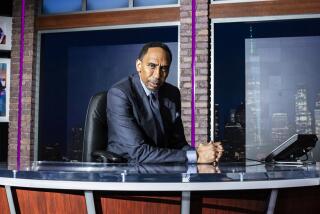Climbing Mt. Russert
- Share via
Concord, N.H. — Waiting at New York’s LaGuardia Airport on Nov. 5 for the delayed 7:35 a.m. flight to Manchester, N.H., George Stephanopoulos was full of guarded hope.
The plan was for ABC’s newest anchor, successor to the venerable David Brinkley’s Sunday morning “This Week” chair, to meet with his colleagues for a three-day trip tracking the newest Democratic presidential candidate, retired Gen. Wesley K. Clark, on the campaign trail. Clark long ago had promised the first Sunday interview to NBC’s dominant Tim Russert, moderator of “Meet the Press,” but Stephanopoulos and executive producer Tom Bettag were confident that if they went to all the trouble to have their anchor show up -- a rarity for the studio-bound Sunday agenda-setters -- the Clark team would cave.
They bet wrong.
Sunday morning newsmaker shows are a model of measured diplomacy on air, but behind the scenes, the fight has become down and dirty, with Russert, the hugely popular incumbent, fending off all comers, and the others scrapping for position as the election year kicks off. Only about 11 million viewers tune in collectively each week, but these are upscale, educated audiences, making the Sunday programs moneymakers for cash-strapped news divisions, generating millions of dollars in profits. A successful Sunday show can have influence far beyond its relatively small reach, generating more viewers for a network’s campaign coverage.
But perhaps just as important, the Sunday shows have shed their reputation for stodginess and are providing an alternative as other network news programs tart up their broadcasts with entertainment, squeeze in more ads and cut questionable deals to land interviews. These programs have become a prestige arena where an administration official can be grilled for an hour and policy trumps celebrities.
So CBS has gloated in recent months as its “Face the Nation with Bob Schieffer” (a half-hour program to the others’ hour) squeaked into second place -- for the first time since 1987. Fox News Channel -- frustrated with its distant fourth-place program that has failed to catch on despite Fox’s success in the cable news world -- just hired Chris Wallace from ABC News as its new front man starting today.
Newcomers are scrapping for a piece of the action. CNN, which already offers “Late Edition with Wolf Blitzer,” is adding a Sunday version of “Judy Woodruff’s Inside Politics” in January, in time for the start of the presidential election season. The year-old syndicated “Chris Matthews Show,” a journalists’ round table, has been outdrawing the network shows in some markets where they air head to head.
As for ABC, it has staked considerable money and pride on its bet that it can turn Stephanopoulos -- in his past life a senior advisor to President Bill Clinton -- into a new face of ABC News, an anchor who will appeal to the younger generation and at the same time help ABC regain the Sunday morning primacy that it long enjoyed until Brinkley stepped down from the anchor seat in November 1996.
It hasn’t been an easy fight. Stephanopoulos, who joined ABC News in 1997 as an analyst, took the helm of “This Week” in July 2002 and in its first year the broadcast tumbled to third in the network race.
In September, the show’s staff was combined with that of “Nightline” and a new format was introduced, relying more heavily on traditional, out-of-studio, edited reports and features such as “The List,” chronicling the week’s memorable moments. Although the relaunch of “This Week” garnered headlines and some good ratings, there remains a formidable roadblock in the form of NBC’s Russert, as ABC found out.
Suing for peace
For two hours midday in New Hampshire, Stephanopoulos and his camera and sound crew, producers and drivers, camped out in the lobby of the Concord Monitor newspaper, lunching from pizza boxes, signing autographs and waiting for Clark. Stephanopoulos had asked an aide to take Clark a written note in which he requested a few minutes to make the ABC case for just a couple of short interviews, which campaigns routinely grant when major reporters show up on the trail. Instead, the candidate sneakily hustled out a side door.
With Clark’s press people determinedly fending off ABC’s cameras, matters turned heated at the state library in Concord. As the candidate introduced his New Hampshire supporters to reporters, Stephanopoulos, Bettag and the aides argued loudly in the next room, the library’s patrons looking on.
Late afternoon, after Bettag declared “you do not treat a network anchor this way” and a Clark aide accused ABC’s producer of lying, Stephanopoulos killed time in a decidedly un-Brinkley pose, slumped on the floor of the lobby in Manchester’s Four Points Sheraton, talking on his plugged-in cellphone.
Before midnight, “This Week” “sued for peace,” as Stephanopoulos put it. ABC would get its interview in December, after the Clark pilgrimage to “Meet the Press.”
A grilling by Russert has become an obligatory stop on the campaign trail. Both Russert and ABC had been asking for an interview since July. The general gave the nod to NBC but then kept putting it off. Russert -- whose show vaulted into first place with a straightforward interview style and a conceit of trapping interviewees by putting their past words on screen with 1950s-era graphics -- said he told Clark communications advisor Chris Lehane that Clark could “do an interview or not do an interview, keep his word or not keep his word. It’s your call and let me know what you decide.”
Fuzzy signal
Wresting the interview from NBC would have sent a strong signal -- but just what signal ABC is trying to send is somewhat fuzzy. Getting newsmakers first still is what Sunday morning is about, and Stephanopoulos says he has occasionally butted heads with Bettag by insisting that “as a rule, you have to have a headliner interview at the top of the show. That’s what makes Sunday morning special.”
But Bettag says “trying to out-Russert Russert is silly.” That’s why the show is going on the road, trailing candidates in the field and traveling to California to interview former First Lady Nancy Reagan.
The new format also is going against not just its rivals but the Washington game as well. Going outside the studio is a way to get around what has become a weekly routine of the White House: doling out interviews with the same officials to all the shows, and media-trained officials who can’t be pushed off-message, said Stephanopoulos, adding “everyone has become so practiced.” Critics snipe, however, that by trying to do an “outsiders” show, ABC officials are wasting Stephanopoulos’ biggest asset -- his Washington insider status.
Moreover, changing lingering memories of Stephanopoulos’ days at the Clinton White House is tough. Practically the first words out of Clark’s mouth when he spied Stephanopoulos in New Hampshire were “Why aren’t you working for me?” Stephanopoulos replied that he had moved on to another job.
The show is differentiating itself in other overt ways. The dominant color scheme is red -- a color usually used in sports TV graphics -- and gold, not the stately blue that every other program uses for its opening credits. Stephanopoulos doesn’t have a stentorian, authoritative voice, so the new announcer is female to minimize the contrast.
Most shockingly, the show jettisoned its round-table discussion, a Brinkley innovation that subsequently became a fixture on rival programs. “I love your show, but I miss the round table,” a middle-age man at the airport told Stephanopoulos. The anchor says he misses it too, but the mandate for the show was “be different.”
Viewers aren’t responding yet in droves, as the show has traded with CBS’ “Face the Nation” for second place in recent weeks, with ABC’s program suffering as it got moved to accommodate sports.
“Fox News Sunday,” despite trailing badly, has shown the most year-to-year growth of all the programs. One big boost for “This Week” may come next fall. ABC is negotiating with its affiliates to add a Sunday version of “Good Morning America,” which would funnel more viewers to the show.
A week after New Hampshire, Stephanopoulos shrugged off the loss. “We tried and we lost. It’s not a loss for me; I was out on the campaign trail for a day,” using the down time to talk with candidate Carol Moseley Braun, stop by a Howard Dean event (where he was singled out for introduction by the candidate) and attend an evening Planned Parenthood debate. “It adds more weight to what I say.”
“We went up there fully prepared to lose, and what we lost is a day and some money,” Bettag said on a Saturday, taking a break from fine-tuning “The Funnies,” a roundup of late-night comedy clips. But, he said, “We showed we’re going to be game for anything, We’re not afraid to make fools of ourselves.”
Waiting has paid off. ABC recently got word that it will be allowed to tag along Dec.17-18 with behind-the-scenes access as Clark -- who as NATO’s former supreme allied commander, Europe, oversaw the resolution of the 1999 Kosovo conflict -- travels to The Hague to testify in the U.N. war crimes trial of former Yugoslav President Slobodan Milosevic. Then it will be back to New Hampshire, and there might even be a rare interview with Clark’s wife, Gert, for the piece that will air Dec.21.
*
(BEGIN TEXT OF INFOBOX)
Fighting for position
The contest for primacy among the Sunday morning newsmakers shows has gotten down and dirty, with NBC’s Tim Russert fending off all comers and the others scrapping for ratings.
TIM RUSSERT
Show: “Meet the Press”
Where: NBC
When: Sundays, 8 a.m.
He matters because: Russert’s show now is the most watched and most quoted Sunday morning news program.
*
BOB SCHIEFFER
Show: “Face the Nation”
Where: CBS
When: Sundays, 7:30 a.m.
He matters because: The chief Washington correspondent projects a folksier persona.
*
GEORGE STEPHANOPOULOS
Show: “This Week”
Where: ABC
When: Sundays, 8 a.m.
He matters because: He is taking the biggest risks in refashioning a news program.
More to Read
The biggest entertainment stories
Get our big stories about Hollywood, film, television, music, arts, culture and more right in your inbox as soon as they publish.
You may occasionally receive promotional content from the Los Angeles Times.










